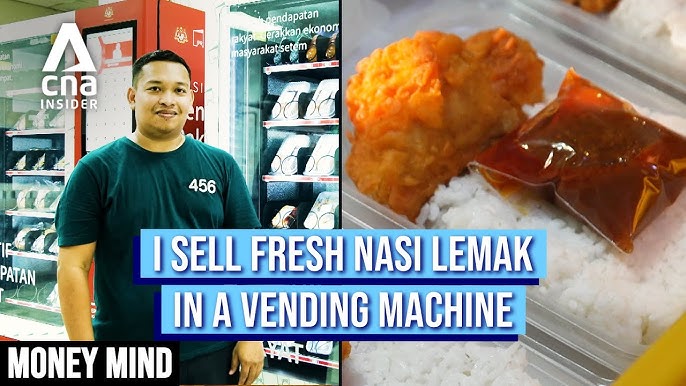
Malaysian Couple Sells Homemade Food From A Vending Machine, Makes 4X More A Month | Money Mind
CNA Insider
1,560,919 views • 1 month ago
Video Summary
A Malaysian couple has significantly increased their income by leveraging a vending machine to sell fresh, homemade food. Instead of a traditional restaurant or stall, they prepare meals daily, ensuring no preservatives are used. This innovative approach allows them to offer food at a competitive price, approximately 30% cheaper than nearby alternatives, and has resulted in profit margins up to 40%. One interesting fact is that the couple initially expected to receive shop space support but were instead allocated a vending machine through a government scheme
Short Highlights
- A Malaysian couple quadrupled their income by selling fresh, homemade food from a vending machine.
- They prepare each menu fresh for lunch and supper, with each batch taking about 3 hours.
- The couple avoids preservatives and buys supplies from wholesalers daily, saving an estimated 40%.
- Items are priced from 1 ringgit for water to 5 ringgit for cooked food, about 30% cheaper than alternatives.
- The government support scheme covered vending machine rental (800 ringgit/month for 2 years), electricity, and maintenanc
Key Details
Vending Machine Food Business Introduction [00:01]
- A Malaysian couple has quadrupled their income by selling fresh, homemade food using a vending machine.
- They do not operate a traditional restaurant or food stall.
- The food sold is not machine-made or frozen.
"The food isn't machine-made or frozen."
Daily Preparation and Packaging [00:21]
- Amin Afifi, 37, and his wife cook each menu fresh for lunch and supper.
- Preparing each batch of food takes approximately 3 hours.
- Once ready, the food is packed immediately and placed in the vending machine within the hour.
- The couple does not use any preservatives in their food.
"Once ready, the food is packed immediately. Within the hour, it's in the vending machine."
Cost-Saving Strategies [01:11]
- Amin cuts costs by personally buying supplies from wholesalers each day.
- This daily shopping is estimated to save him up to 40%.
- He repeats the cooking cycle for evening deliveries, working more than 9 hours a day, 7 days a week.
"Amen cuts cost by personally buying supplies from wholesalers each day. He estimates that saves him up to 40%."
Vending Machine Placement and Sales [01:40]
- Sales peak for supper.
- The vending machine is strategically located right outside a university dorm.
- Amin tracks sales, stock, and product performance via an app linked to his machine.
"His vending machine sits right outside a university dorm."
Pricing and Profitability [02:27]
- Items are priced from 1 ringgit for a bottle of water to 5 ringgit for cooked food like Nasi Lemak.
- This pricing is about 30% cheaper than nearby alternatives.
- Amin sells approximately 120 packets of food each day.
- His profit margin is up to 40%.
"The items are priced from 1 ringgit for a bottle of water to 5 ringgit for cooked food like Nasi Lama. That's about 30% cheaper than nearby alternatives."
Income Transformation [03:10]
- The vending machine business has resulted in earnings four times what he used to make selling cakes from door to door.
"That's four times what he used to earn selling cakes from door to door."
Government Support Scheme [03:33]
- Amin signed up for a government support scheme aimed at improving the financial independence of lower-income households.
- He initially expected assistance to secure a shop space.
- Instead, he was allocated a vending machine.
- The scheme covers the cost of renting the vending machine, approximately 800 ringgit a month, for 2 years.
- It also covers electricity and maintenance costs.
"Instead, he was allocated a vending machine."
Operational Costs and Challenges [04:20]
- Amin is responsible for paying for the stocked items, which amounts to about 6,000 ringgit a month.
- Business is not always smooth; sales drop by more than 80% during university holidays.
"Amen has to pay for what he stocks, which comes up to about 6,000 ringgit a month."
Future Prospects and Business Continuity [04:54]
- Amin's 2-year government support period is nearing its end.
- He intends to continue the business and is prepared to cover the machine's rental, electricity, and maintenance costs.
- He is uncertain how these future expenses will impact his profits.
- He is also considering scaling up, potentially through catering or acquiring another vending machine.
- The experience of being a vending machine boss has been financially rewarding.
"But no matter what lies ahead, being a vending machine boss has paid off."
Other People Also See



